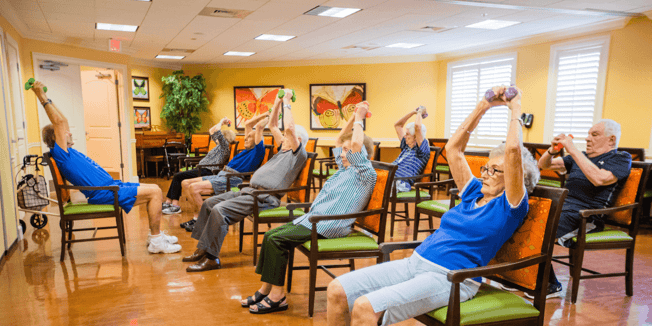Helped Living: a Compassionate Environment for Senior Citizens With Memory Obstacles
Assisted living facilities increasingly work as compassionate environments customized to the special needs of senior citizens facing memory obstacles. By supplying individualized care and structured regimens, these areas not just improve cognitive function but also foster emotional connections, reducing isolation among citizens. Specialized strategies, such as songs therapy and reminiscence strategies, are used by trained team to promote deeper interaction. The effectiveness of these treatments frequently pivots on the participation of households in the treatment process, motivating a better examination of exactly how this collaborative initiative influences results for both residents and enjoyed ones.
Comprehending Memory Obstacles
Comprehending memory challenges is necessary for supplying effective like senior citizens facing cognitive decline. Memory problems, which can manifest as forgetfulness, complication, or problem remembering recent occasions, are commonly symptoms of problems such as Alzheimer's disease or other types of mental deterioration. These challenges can considerably influence an elderly's ability to carry out day-to-day jobs, maintain social relationships, and manage personal security.
Acknowledging the different phases of cognitive decrease is crucial for caregivers and health care experts. Early-stage memory loss might entail mild forgetfulness, while mid-stage decline can lead to more pronounced disorientation and confusion. In late-stage dementia, individuals may shed the capacity to communicate properly, calling for comprehensive support and understanding from caregivers.
This necessitates a compassionate strategy to care that prioritizes the psychological health of the individual. Eventually, a deep understanding of these difficulties is fundamental to supplying thoughtful and reliable treatment for seniors encountering cognitive decline.
Benefits of Assisted Living
Helped living offers countless benefits for elders with memory difficulties, providing a supportive setting that cultivates freedom while ensuring security and care. Among the main benefits is the day-and-night guidance and assistance offered, which helps mitigate threats linked with memory-related problems. Assisted Living. This constant assistance enables seniors to involve in daily activities without the concern of accidents or complication
In addition, aided living facilities commonly provide organized regimens that can boost cognitive function and security. These routines aid homeowners feel more safe and decrease anxiety, as they understand what to expect daily. Social interaction is one more substantial benefit, as these atmospheres urge connections among citizens, advertising emotional well-being and minimizing feelings of seclusion.
In addition, assisted living personnel are educated to identify the unique needs of senior citizens with memory obstacles, enabling individualized care strategies that address individual preferences and requirements. This customized approach not only improves the high quality of treatment however additionally encourages seniors to preserve a sense of autonomy. In page general, assisted living works as a thoughtful remedy, balancing the demand for assistance with the desire for self-reliance in the lives of senior citizens facing memory challenges.
Specialized Care Approaches
Applying specialized care methods is necessary for properly sustaining elders with memory obstacles. One essential strategy is person-centered treatment, which emphasizes the significance of understanding each homeowner's life background, choices, and worths.
Another critical strategy entails making use of cognitive stimulation therapies. Tasks created to improve memory recall, encourage social communication, and advertise imagination can significantly impact locals' general wellness. Methods such as reminiscence therapy utilize individual memories to spark discussion and link, while songs therapy can evoke emotions and memories, giving convenience.

Creating a Helpful Community
(Dementia Care Charlotte)A helpful neighborhood plays an important function in improving the lives of seniors with memory challenges. Such a community promotes a setting of understanding, compassion, and inspiration, which is vital for people encountering cognitive difficulties. By producing a network of support, assisted living facilities can dramatically enhance the lifestyle for locals.
Central to a supportive area is the visibility of experienced staff who are delicate to the one-of-a-kind needs of senior citizens with memory disabilities. These experts not only provide crucial treatment but likewise engage residents in purposeful activities that promote cognitive feature and promote social interaction. Programs that motivate participation in team exercises, arts and crafts, or memory video games can enhance both physical and psychological wellness.
In addition, a supportive neighborhood advertises solid links amongst residents. Motivating relationships and peer assistance aids to reduce feelings of seclusion and fosters a feeling of belonging. Regular gatherings and common eating experiences can even more reinforce these bonds, producing an ambience where senior citizens really feel valued and comprehended.
Involving Family Members in Treatment
Involving family members in the treatment procedure is vital for supplying comprehensive support to elders with memory challenges. Household participants typically act as important supporters, using understandings into the individual's preferences, background, and routines that can improve individualized care. By including them in discussions and treatment preparation, helped living facilities can create an extra all natural technique that resonates with the local's demands.

Urging family members to take part in care not just improves the well-being of the elderly however also provides psychological assistance to household members. Including family members in treatment cultivates a sense of area and belonging, making certain that senior citizens feel connected to their enjoyed ones. Ultimately, a collective strategy to care enriches the lives of both homeowners and their families, creating a compassionate and encouraging environment that promotes dignity and regard.
Conclusion
In final thought, aided living offers as an important resource for senior citizens experiencing memory difficulties, using individualized treatment tailored to individual requirements. By including family members in the treatment procedure, aided living produces a comprehensive assistance network, ultimately improving the lives of citizens and their loved ones.